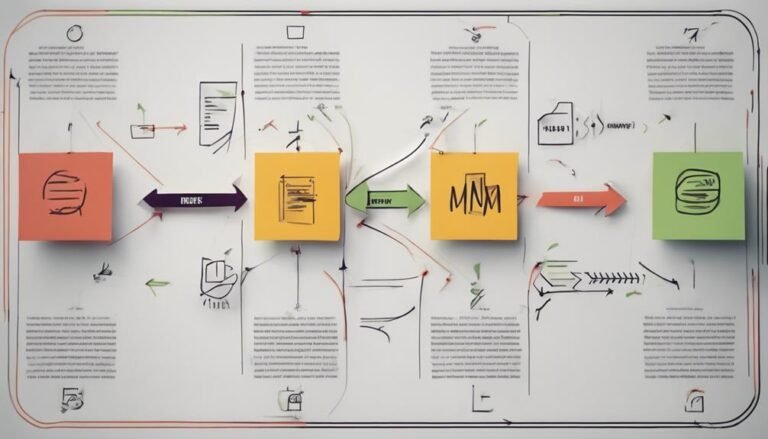Supply Chain Optimization for Small Businesses
In the realm of small businesses, the realm of supply chain optimization stands as a crucial element that can make or break the efficiency and success of operations.
By streamlining processes, businesses can unlock a myriad of benefits that extend beyond mere cost reduction. The intricate dance of inventory management, supplier relationships, and logistics can significantly impact the bottom line and customer satisfaction levels.
As we explore the strategies and tools available for enhancing supply chain performance, small business owners are presented with an opportunity to propel their ventures towards greater operational excellence and competitive edge.
Key Takeaways
- Cost savings and efficiency gains through optimized processes
- Competitive edge with improved responsiveness and customer satisfaction
- Strategic cost reduction strategies for small business success
- Utilizing tools for performance enhancement and streamlined operations
Importance of Supply Chain Optimization
Optimizing the supply chain is a crucial strategic initiative for small businesses seeking to enhance efficiency, reduce costs, and improve overall operational performance. By streamlining processes, minimizing waste, and enhancing communication between suppliers, manufacturers, and distributors, small businesses can achieve increased efficiency and gain a competitive advantage in the market.
Increased efficiency is a key outcome of supply chain optimization for small businesses. By fine-tuning inventory management, implementing lean practices, and utilizing technology for real-time tracking, companies can operate more smoothly and respond quickly to fluctuations in demand. This efficiency not only reduces operational costs but also allows for better utilization of resources, leading to improved productivity and customer satisfaction.
Furthermore, a well-optimized supply chain can provide small businesses with a competitive advantage. By delivering products faster, more reliably, and at lower costs than competitors, companies can differentiate themselves in the market and attract more customers. This strategic edge can result in increased market share, stronger brand loyalty, and sustainable growth over time.
Key Benefits for Small Businesses
Enhancing supply chain efficiency can yield significant advantages for small businesses, fostering improved operational performance and cost savings. By streamlining processes and optimizing operations, small businesses can achieve improved efficiency throughout their supply chain. This enhanced efficiency leads to reduced lead times, lower inventory carrying costs, and increased productivity.
One key benefit of improved efficiency is the competitive advantage it provides. Small businesses that can deliver products or services more quickly and cost-effectively than their competitors are better positioned to attract and retain customers. Additionally, a well-optimized supply chain allows for better responsiveness to changing market demands, giving small businesses a strategic edge in the marketplace.
Moreover, enhanced supply chain efficiency can result in better relationships with suppliers and partners. By improving communication, collaboration, and overall performance within the supply chain, small businesses can foster stronger partnerships that benefit all parties involved. Overall, investing in supply chain optimization can have a transformative impact on the success and sustainability of small businesses.
Strategies to Reduce Costs
Improving cost efficiency is paramount for small businesses aiming to bolster their financial health and competitiveness in the market. By implementing cost-saving techniques and efficiency improvements in their supply chain, small businesses can enhance their bottom line and gain a competitive edge. Here are some strategies that small businesses can consider to reduce costs:
| Cost Saving Techniques | Efficiency Improvements | Benefits |
|---|---|---|
| Negotiate with suppliers for better pricing | Implement lean inventory management | Lower procurement costs |
| Opt for bulk purchasing to secure discounts | Streamline order processing with automation | Reduced per unit costs |
| Use technology for process optimization | Invest in employee training for skill development | Improved productivity and quality |
| Outsource non-core functions to reduce overhead | Optimize transportation routes for cost savings | Focus on core competencies |
Enhancing Customer Satisfaction
Customer satisfaction plays a pivotal role in shaping the reputation and longevity of small businesses. Ensuring that customers are happy with their overall experience can lead to increased customer loyalty and positive word-of-mouth referrals. To enhance customer satisfaction and drive business growth, small businesses can focus on the following strategies:
- Personalized Customer Interactions: Tailoring interactions to meet individual customer needs can foster a sense of appreciation and loyalty.
- Efficient Delivery Speed: Timely delivery of products/services can significantly impact customer satisfaction levels, emphasizing the importance of optimizing delivery processes.
- Quality Products/Services: Consistently delivering high-quality offerings reinforces trust and satisfaction among customers.
- Effective Communication: Keeping customers informed about order status, delays, or any issues that may arise demonstrates transparency and can help manage customer expectations, ultimately leading to higher satisfaction levels.
Tools for Performance Improvement
Optimizing operational efficiency through strategic utilization of performance enhancement tools is essential for small businesses seeking sustained growth and competitive advantage in today's dynamic market landscape. Two key areas where such tools can significantly impact small businesses are inventory management and technology integration.
Inventory Management:
Effective inventory management tools help in streamlining the supply chain process, reducing carrying costs, and minimizing stockouts. By leveraging tools like ABC analysis, Just-in-Time (JIT) inventory systems, or advanced forecasting software, small businesses can optimize their inventory levels, improve order fulfillment rates, and enhance overall operational efficiency.
Technology Integration:
Small businesses can benefit from integrating technology tools such as Enterprise Resource Planning (ERP) systems, Warehouse Management Systems (WMS), and Customer Relationship Management (CRM) software. These tools enable automation of processes, real-time data tracking, improved communication within the supply chain, and enhanced decision-making capabilities.
Conclusion
In conclusion, small businesses can greatly benefit from optimizing their supply chain to reduce costs and enhance customer satisfaction.
By implementing strategies to streamline processes and improve performance, businesses can achieve greater efficiency and profitability.
Just as a well-oiled machine operates smoothly and efficiently, a well-optimized supply chain can drive success and growth for small businesses.







